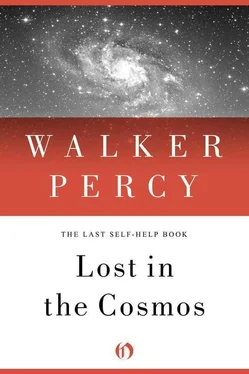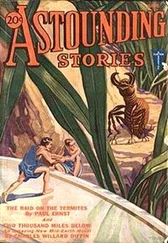Walker Percy
Lost in the Cosmos
For my fellow space travelers, John Walker, Robert, David, Jack
We are unknown, we knowers, to ourselves … Of necessity we remain strangers to ourselves, we understand ourselves not, in our selves we are bound to be mistaken, for each of us holds good to all eternity the motto, “Each is the farthest away from himself”—as far as ourselves are concerned we are not knowers.
NIETZSCHE
O God, I pray you to let me know my self.
ST. AUGUSTINE
LOST IN THE COSMOS: THE LAST SELF-HELP BOOK
or
The Strange Case of the Self, your Self, the Ghost which Haunts the Cosmos
or
How you can survive in the Cosmos about which you know more and more while knowing less and less about yourself, this despite 10,000 self-help books, 100,000 psychotherapists, and 100 million fundamentalist Christians
or
Why it is that of all the billions and billions of strange objects in the Cosmos — novas, quasars, pulsars, black holes — you are beyond doubt the strangest
or
Why it is possible to learn more in ten minutes about the Crab Nebula in Taurus, which is 6,000 light-years away, than you presently know about yourself, even though you’ve been stuck with yourself all your life
or
How it is possible for the man who designed Voyager 19, which arrived at Titania, a satellite of Uranus, three seconds off schedule and a hundred yards off course after a flight of six years, to be one of the most screwed-up creatures in California — or the Cosmos
plus
A Twenty-Question Quiz which will not help you become rich or more assertive or more creative or make love better but which may — though it probably won’t, considering how useless self-help books generally are — help you discover who you are not and even — an outside chance — who you are
plus
A preliminary short quiz which you can take standing in a bookstore and which will allow you to determine whether you need to buy this book and proceed to the Twenty Questions
plus
A short history of the Cosmos, including a semiotic theory of the Self which explains why it is that man is the only alien creature, as far as we know, in the entire Cosmos
plus
A space odyssey which gives an account of what can happen to an earthling astronaut if there is somebody out there and what can happen if there is no one out there
Preliminary Short Quiz
so that you may determine whether you need to take the Twenty-Question Self-Help Quiz. If you can answer these questions, you are not lost in the Cosmos
IMAGINE THAT YOU ARE reading a book about the Cosmos. You find it so interesting that you go out and buy a telescope. One fine clear moonless night you set up your telescope and focus on the brightest star in the sky. It is a planet, not a star, with a reddish spot and several moons. Excited, you look up the planets in your book about the Cosmos. You read a description of the planets. You read a sentence about a large yellowish planet with a red spot and several moons. You recognize both the description and the picture. Clearly, you have been looking at Jupiter.
You have no difficulty at all in saying that it is Jupiter, not Mars or Saturn, even though the object you are looking at is something you have never seen before and is hundreds of millions of miles distant.
Now imagine that you are reading the newspaper. You come to the astrology column. You may or may not believe in astrology, but to judge from the popularity of astrology these days, you will probably read your horoscope. According to a recent poll, more Americans set store in astrology than in science or God.
You are an Aries. You open your newspaper to the astrology column and read an analysis of the Aries personality. It says among other things:
You have the knack of creating an atmosphere of thought and movement, unhampered by petty jealousies. But you have the tendency to scatter your talents to the four winds.
Hm, you say, quite true. I’m like that.
Suddenly you realize you’ve made a mistake. You’ve read the Gemini column. So you go back to Aries:
Nothing hurts you more than to be unjustly mistreated or suspected. But you have a way about you, a gift for seeing things through despite all obstacles and distractions. You also have a desperate need to be liked. So you have been wounded more often than you will admit.
Hm, you say, quite true. I’m like that.
The first question is: Why is it that both descriptions seem to fit you — or, for that matter, why do you seem to recognize yourself in the self-analysis of all twelve astrological signs? Or, to put it another way, why is it that you can recognize and identify the planets Jupiter and Venus so readily after reading a bit and taking one look, yet have so much trouble identifying yourself from twelve descriptions when, presumably, you know yourself much better than you know Jupiter and Venus?
(2) Can you explain why it is that there are, at last count, sixteen schools of psychotherapy with sixteen theories of the personality and its disorders and that patients treated in one school seem to do as well or as badly as patients treated in any other — while there is only one generally accepted theory of the cause and cure of pneumococcal pneumonia and only one generally accepted theory of the orbits of the planets and the gravitational attraction of our galaxy and the galaxy M31 in Andromeda? (Hint: If you answer that the human psyche is more complicated than the pneumococcus and the human white-cell response or the galaxies or Einstein’s general theory of relativity, keep in mind that the burden of proof is on you. Or if you answer that the study of the human psyche is in its infancy, remember then this infancy has lasted 2,500 years and, unlike physics, we don’t seem to know much more about the psyche than Plato did.)
(3) How do you explain these odd little everyday phenomena with which everyone is familiar:
You have seen yourself a thousand times in the mirror, face to face. No sight is more familiar. Yet why is it that the first time you see yourself in a clothier’s triple mirror — from the side, so to speak — it comes as a shock? Or the first time you saw yourself in a home movie: were you embarrassed? What about the first time you heard your recorded voice — did you recognize it? Clearly, you should, since you’ve been hearing it all your life.
Why is it that, when you are shown a group photograph in which you are present, you always (and probably covertly) seek yourself out? To see what you look like? Don’t you know what you look like?
Has this ever happened to you? You are walking along a street of stores. There are other people walking. You catch a glimpse in a store window of a reflection of a person. For a second or so you do not recognize the person. He, she, seems a total stranger. Then you realize it is your own reflection. Then in a kind of transformation, the reflection does in fact become your familiar self.
One of the peculiar ironies of being a human self in the Cosmos: A stranger approaching you in the street will in a second’s glance see you whole, size you up, place you in a way in which you cannot and never will, even though you have spent a lifetime with yourself, live in the Century of the Self, and therefore ought to know yourself best of all.
The question is: Why is it that in your entire lifetime you will never be able to size yourself up as you can size up somebody else — or size up Saturn — in a ten-second look?
Why is it that the look of another person looking at you is different from everything else in the Cosmos? That is to say, looking at lions or tigers or Saturn or the Ring Nebula or at an owl or at another person from the side is one thing, but finding yourself looking into the eyes of another person looking at you is something else. And why is it that one can look at a lion or a planet or an owl or at someone’s finger as long as one pleases, but looking into the eyes of another person is, if prolonged past a second, a perilous affair?
Читать дальше












